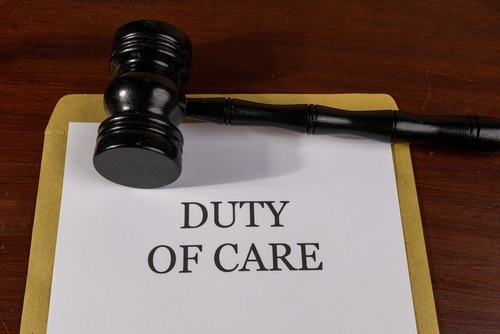Duty of care is a term that often comes up when finding care. It means the care provider’s legal and moral duty to keep their service users as safe and well as possible.

Page contents
What is meant by duty of care?
Duty of care means a business, official body or individual must safeguard people in their employment, using their services or in their property. There is a fixed set of legal guidelines around this. It is a term that that applies in many contexts.
For example, UK employers must look after the health, safety and welfare of all their employees. This is under the Health and Safety at Work Act 1974. Meanwhile, homeowners in England and Wales are legally obliged to prevent the risk of accidents to any visitors to their homes. This is under the Occupiers’ Liability Act 1957.
What is duty of care in health and social care?
The meaning of duty of care in health and social care is that care providers are responsible for providing a good standard of care to people who use their service.
It also applies to Local Authorities who must maintain a proper process of identifying people in their district who need care, funding that care if they cannot, and meeting their care and support needs.
What is your duty of care as a care worker?
A care worker’s duty of care is the responsibility of providing a good standard of care to those they support. They must use both the person’s care plan and proper judgement to keep the person safe from mental and physical abuse or harm. It is part of the code of conduct.
Care workers’ duty of care also includes cooperating with other healthcare professionals to support the best interests of the person in their care. If they have any concerns about the person’s care, wellbeing or safety, they should use their employer’s specific process to report these concerns.
Examples of duty of care in health and social care
- Ensuring equipment is used and stored safely.
- Keeping the person’s home clean and tidy. This is both for their own comfort and to prevent falls and other health hazards, such as fire or mould.
- Treating the person with dignity, respect and compassion.
- Treating the person’s home and belongings with care and respect.
- Following the person’s care plan and making sure all tasks required on each visit are completed.
- Keeping accurate records of the care provided on each visit.
- Reporting any concerns about the person’s health or well being.
What does the Care Act 2014 say about duty of care?
The Care Act was created to unite various rules and laws into one consistent standard of care for everybody. It only applies to England. Scotland, Wales and Northern Ireland follow different legislation and each has their own adult social care framework.
Under the Care Act 2014, Local Authorities have the duty of care to:
Conduct a needs assessment
The Local Authority must conduct a needs assessment on any adult who may be in need of care (section 9).
If the person refuses, the LA doesn’t have to do the assessment unless they lack mental capacity or they are at risk of abuse or neglect (section 11).
The LA must give the person a written record of their assessment (section 12).
Conduct a financial assessment for people who need care
If a person is assessed as needing care through the needs assessment, the LA has a duty to conduct financial assessment (section 17).
If person meets criteria under needs assessment and financial assessment, the LA has a duty to meet their needs for care and support (section 18).
Assess and offer support to unpaid carers
The Local Authority must assess whether an unpaid carer needs support through a Carer’s Assessment (section 10).
The carer has the right to refuse a Carer’s Assessment and any support offered (section 11).
The LA must give the person a written record of their assessment (section 12).
In order to arrange an assessment, contact your Local Authority. You can find their contact details on their website, which you can search for on this NHS council website finder.


